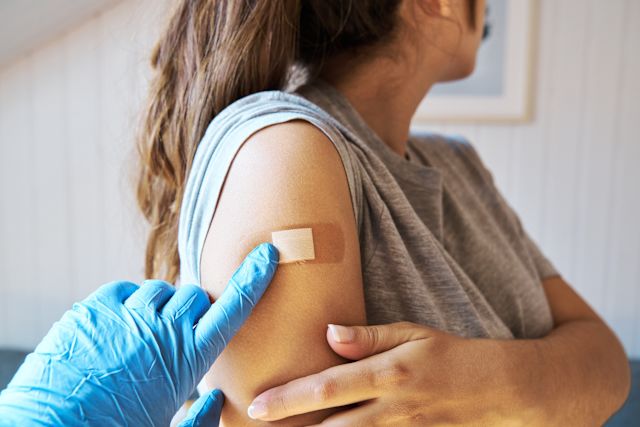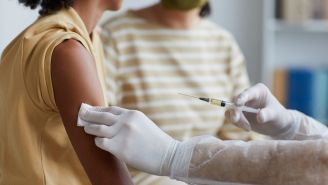Updated on September 20, 2024.
Vaccines save lives. They teach your body how to fight infections—even before you get them. A landmark May 2024 study published in The Lancet estimates that over the past five decades, vaccinations for just 14 diseases have saved about 154 million lives around the world. That’s about six lives every minute of every year for 50 years.
In the United States, there are vaccines that protect against 30 different diseases, including:
- Chickenpox (varicella)
- COVID-19
- Diphtheria
- Flu (influenza)
- Hepatitis A and B
- Hib (Haemophilus influenzae type b)
- HPV (human papillomavirus)
- Measles, mumps, and rubella
- Meningococcal
- Pneumococcal
- Polio (poliomyelitis)
- Rotavirus
- RSV (respiratory syncytial virus)
- Shingles (herpes zoster)
- Tetanus (lockjaw)
- Whooping cough (pertussis)
But fewer people are being vaccinated. This could undo a lot of the progress that’s been made. It also puts certain people at greater risk for preventable illnesses, including:
- Those with chronic health issues, like diabetes and heart disease
- Older people
- Infants too young to be immunized
Here are some common reasons why certain people avoid vaccines—and what to know about them:
They have been treated differently
People who get vaccines trust that they will help protect them—not cause harm. If you get a vaccine you want to be sure that they are safe and that they will work. Millions of people do. But some people are less likely to have that trust and confidence. People may lose trust if they are treated:
- Unfairly
- Unkindly
- Differently
- Disrespectfully
Racism, in particular, has profound effects on people’s health and well-being. Its effects are “perhaps the most pervasive, widespread, and long-lasting,” a January 2022 research article published in Circulation: Cardiovascular Quality and Outcomes.
To a significant degree, skin color determines a person’s risk of disease and death. But the completion of the Human Genome Project in 2003 (an international research project that sequenced more than 90 percent of the human genome) confirmed humans are 99.9 percent identical at the DNA level. Bottom line: there is no genetic basis for race.
Scientists have long understood that race is a social construct—an idea that is created and generally accepted by people in a society. In its least harmful application, race may be used to classify groups of people according to cultural or other differences. But in its most toxic and misguided application, it has been used to assign value to certain groups and engineer a social hierarchy, according to a 2021 systematic review published in Evolution, Medicine & Public Health.
The experience of racism and bias may affect people’s trust and willingness to receive vaccines. Trust is earned. Healthcare providers (HCP) must help ensure people feel comfortable. They should consider their patients’ culture and diverse backgrounds. They should explain things in ways that help people understand how vaccines work and why they are so important. Seeking out HCPs that provide the clarity and reassurance you need can help protect your long-term health.
They face other barriers to care
Sometimes people don’t get vaccines because of where they live or how they grow up. For example:
- Maybe the distance to the closest vaccination place is far and you don’t have a way to get there.
- Maybe you can’t get to a medical appointment because you do not have time off from work.
- Maybe you do not have a healthcare professional (HCP) that speaks your language or understands your views.
- Maybe you do not have enough information about vaccines. You may not know which ones they need and when.
These things can make it harder to get vaccinated. Talk to your HCP or a local pharmacist if you or your child is missing vaccines. There may be closer or more convenient options. In many areas, free vaccines are also available at:
- Pharmacies
- Health clinics
- County health departments
They worry about side effects
All medicines can cause side effects. Side effects are things that can happen to your body when you take medicine. Sometimes these changes are actually helpful. Sometimes they can be uncomfortable. But the side effects of vaccines are usually mild. And for most people, they do not last for more than a few days.
Some of the most common issues include:
- Soreness or swelling where the shot was given
- A low fever
- Headache
- Tiredness
- Dizziness
But overall, vaccine side effects are usually much less serious than the infections they prevent. For example, measles can be deadly. It can also cause:
- Ear infection
- Diarrhea
- A lung infection called pneumonia
- Viral croup. This is a condition that causes the airway to swell. It can make it hard to breathe.
- Problems during pregnancy
- A serious condition that causes brain inflammation. It is called subacute sclerosing panencephalitis (SSPE)
Polio is another serious disease. It infects the brain stem or spinal cord. It can cause people to become paralyzed. This means they could lose the ability to move their arms and legs.
They have other safety concerns
People start getting vaccines soon after they are born. But this does not hurt them—it protects them. Before vaccines many children did not live past the age of 5.
Vaccines go through a very careful approval process:
- Step 1: They are tested in animals
- Step 2: They are tested in a small group of people who volunteer
- Step 3: They are tested in larger groups of different people who volunteer over time
These steps help researchers learn about common side effects and well as rare side effects.
The companies that make vaccines must explain how and where the vaccine is made. Health officials review this information. And they decide if a vaccine is safe to give to people. Then it will be monitored over time. This is to make sure that:
- It continues to be safe
- It continues to be effective
- It only contains safe amount of the correct ingredients
Many people think COVID vaccines were rushed. These vaccines were developed more quickly than usual. But this is because so many people around the world were working on it. The technology for mRNA vaccines has actually been around for 30 years. These vaccines are safe and effective.
They are confused by misinformation
Misinformation is information that is false or not entirely true. It can be harmful. It can cause confusion and lead to medical myths that linger—but are not true.
For example, some people say kids’ immune systems are overloaded if too many vaccines are given at one time. This is not true. Children’s (and adults’) immune systems are fighting thousands of germs every day. Studies show that their immune systems can easily handle it.
The vaccines given to kids do not “use up” even a tiny fraction of what their immune systems can do. This is because lymphocytes—a type of white blood cell that are part of the immune system and help seek out and destroy invading germs—are continuously being produced and released.
During the COVID pandemic, there were rumors that mRNA vaccines change your DNA or make people infertile. This is not true. These vaccines contain a tiny piece of genetic information from a virus. This genetic information tells your immune system how to create antibodies to kill the virus. And once its job is done, your body gets rid of it.
It's comforting to talk to someone you know. It may be easier to trust someone in your family or a friend. And if you know someone who had a bad experience, it may be easy to think the same will happen to you. But this is called anecdotal evidence. What happens to one person doesn’t predict or explain what is likely to happen to most people.
It can be hard to spot misinformation. And it may be tough to overlook someone else’s bad experience. So, what you can do is rely on evidence-based medicine. This is a collection of all the experiences of large groups of people over time. Your HCP can help you make informed health decisions that are based on real world data and other scientific evidence. Your HCP can also help you tell the difference between misinformation—and fact. If you have a concern, ask for more information. Learn more about vaccines and how they work. This can help you feel more at ease.
They have a fear of needles
People may not be surprised if a small child is afraid of needles. But this fear affects adults, too. Some people faint around needles. Others may feel anxious or panic.
Most vaccines are given in the form of a shot. If you are afraid of needles, this can make you not want to be vaccinated. And adults who are afraid of needles may not want to take their kids to get vaccinated either. But not getting vaccinated puts you and the people around you at risk for serious diseases and health problems. There are some things you can try to help you overcome this fear.
- Consider how important vaccines are. Focusing on how a shot will help protect you may help you have the courage to get it. Getting a vaccine takes a few minutes. The protection you get from vaccines will last a long time.
- Ask your HCP if you can get you vaccine in a private place. It may help you feel more secure if you are in a quiet spot with fewer people around. There are clinics that help people with disabilities receive their vaccines. These places may be calmer and quieter. Ask you HCP for help in finding a vaccination site that is right for you.
- Distract yourself. When you’re getting a shot, you can try to take your mind off if the fear. Focus on a video, a toy, or bring someone with you to talk to you while it happens.
- Ask your HCP if there is a way to numb your skin before the shot. Sometimes there are numbing sprays and creams that can help ease the pinch of a needle.
If these tips are not helpful, let your HCP know. Tell your HCP about your fear of needles. Your HCP can help you find other ways to make sure you can receive your vaccines.
They think it’s better to get the disease than the vaccine
Your immune system protects you from germs every day. If you get an infection, it will learn how to fight it. And it will try to clear it from your body. This is called natural immunity. But getting a disease doesn’t protect you more than a vaccine. It is also much more dangerous.
Certain vaccines, however, may actually provide superior protection than natural immunity. For example, the high level of purity of the protein in the HPV vaccine results in a more robust immune response.
Even people who get tetanus are advised to get the tetanus vaccine. This is because the toxin made by tetanus is so powerful that the amount that causes disease is lower than the amount that triggers long-term immunity.
The Haemophilus influenzae type b (Hib) vaccine and the pneumococcal vaccine also produce greater immune responses.
They think vaccines aren’t necessary
Vaccines are so helpful that some diseases are now rare. Some may think they are gone for good. They’re not. Polio is a good example.
Thousands of people used to get polio each year. People were so scared of the disease that they stayed home. Some people didn’t let their kids play with other kids. Few people think about polio anymore. But that doesn’t mean it’s gone. It means we have the benefit of herd immunity—when the number of people in a community who are vaccinated against a disease is so high that the infection has few opportunities to spread. If people stopped getting vaccinated however, the disease would come back. Infections and germs only stop spreading if enough people are vaccinated.







